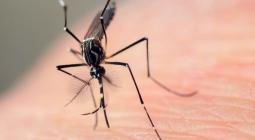Risk of mosquito-borne diseases rises in EU as heatwaves, flooding increase

As a result of climate change, Europe is facing a massive increase of disease-carrying mosquitoes in countries that were previously not affected, the European Centre for Disease Prevention and Control (ECDC) warned on Wednesday (28 June).
The heatwaves across Europe last summer were “unusually intense and widespread”, the Earth observation component of the EU’s Space programme’s Copernicus reported in September 2022.
According to ECDC Director Andrea Ammon, “this creates more favourable conditions for invasive mosquito species such as Aedes albopictus, a known vector of chikungunya and dengue viruses, and Aedes aegypti, known to transmit dengue, yellow fever, chikungunya, Zika and West Nile viruses”.
This year in the EU the Aedes albopictus mosquito was established in 13 countries and 337 regions, whereas 10 years ago it was present in only eight EU countries, with 114 regions being affected.
According to the ECDC, the Aedes aegypts mosquito was first identified in Cyprus in 2022 and has since continued to spread to other EU countries.
“If this continues, we can expect to see more cases and possibly deaths from diseases such as dengue, chikungunya and West Nile fever,” warned Ammon.
ECDC’s data show that 1,133 human cases and 92 deaths of West Nile virus infection were reported in the EU in 2022 of which 1,112 were locally acquired in 11 countries, the highest number of cases since the peak epidemic year in 2018.
Dengue explosive outbreaks
The dengue virus is endemic in all continents – Africa, the Americas, South Asia, and the Western Pacific region – but in Europe. However, due to global warming, the risk is growing.
“Dengue is spreading to new areas including Europe, and explosive outbreaks are occurring,” according to the World Health Organisation (WHO).
Local transmission was reported for the first time in France and Croatia in 2010, and imported cases were detected in three other EU countries.
In 2022, 71 cases of locally acquired dengue were recorded in Europe – 65 cases in France, and six cases in Spain, which is equivalent to the total number of cases reported between 2010 and 2021, ECDC found.
Even if for most people getting dengue is not lethal, the infection can cause high fever, headache, body aches, nausea and rash or require care in a hospital.
Summer recommendations
Not all viruses transmitted by mosquitoes have vaccines. While dengue and yellow fever have vaccines, zika and West Nile fever do not.
In order to avoid mosquito bites, the ECDC established a list of recommendations, especially as summer is coming.
“Sustainable ways to control mosquito populations include eliminating standing water sources where mosquitoes breed, using eco-friendly larvicides, and promoting community awareness about mosquito control,” according to ECDC’s press release.
On a personal level, each person can also set up habits to stay safe from mosquitoes including using mosquito bed nets, sleeping in air-conditioned rooms, wearing clothes that cover most of the body and using mosquito repellent.
In the meantime, the ECDC also recommends raising awareness among citizens and healthcare professionals who are not necessarily aware that mosquitoes from Africa and Asia have been identified in Europe.
“Efforts need to focus on ways to control mosquito populations, enhancing surveillance and enforcing personal protective measures,” concluded Ammon.
cover photo:In 2023, the Aedes albopictus mosquito was established in 13 countries and 337 regions, whereas ten years ago it was present in only eight EU countries, with 114 regions being affected. [frank60/Shutterstock]









